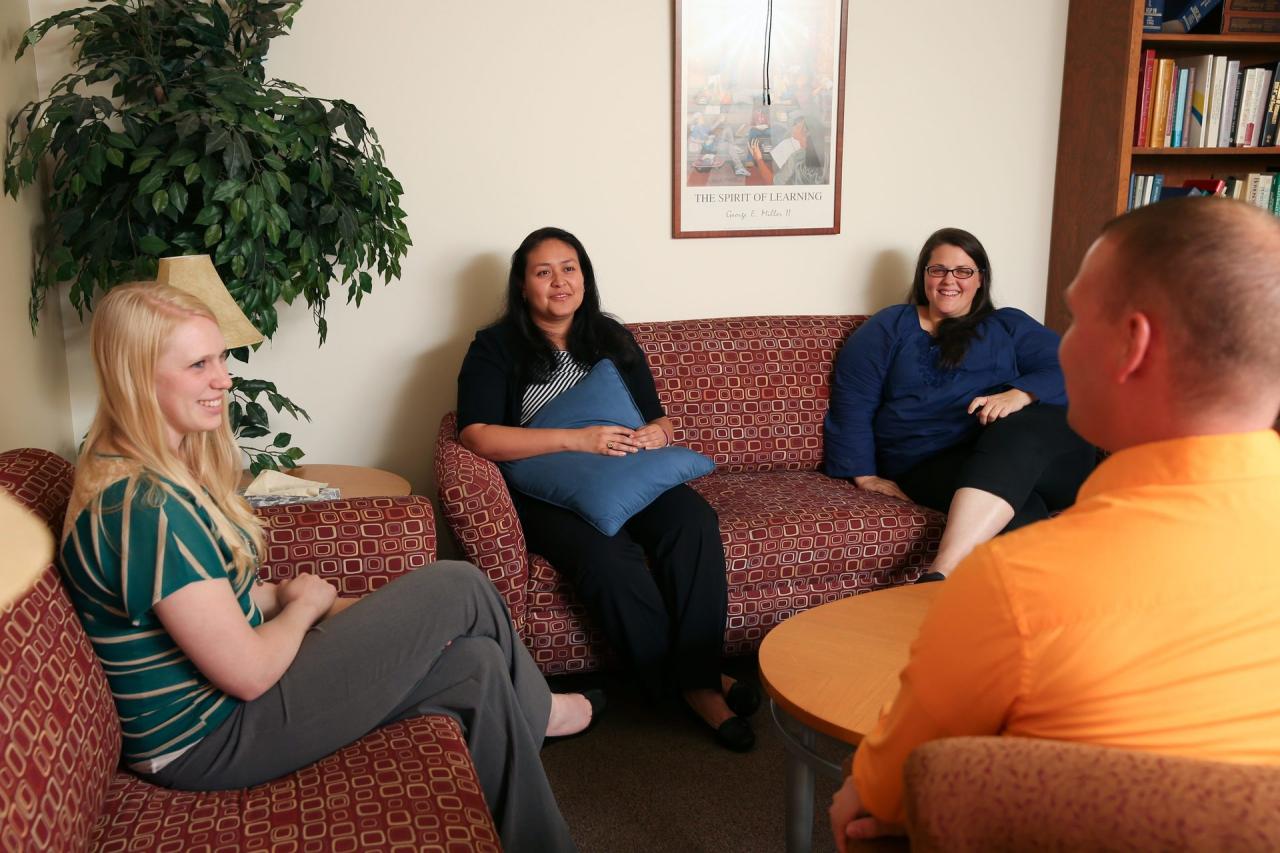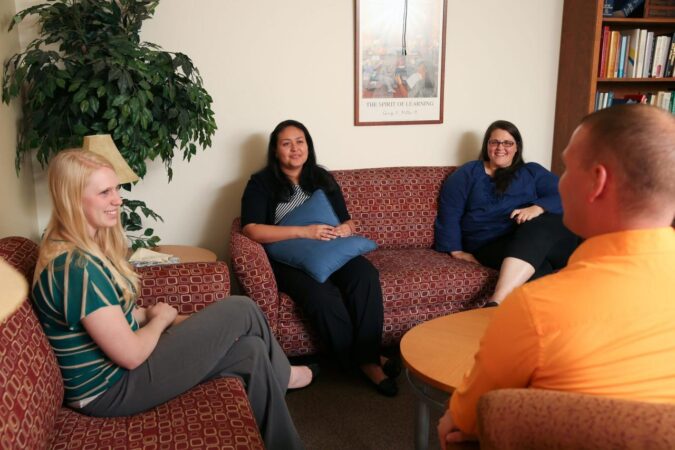
- Introduction to Clinical Mental Health Counseling Master’s Degree
- Core Curriculum and Coursework
- Practicum and Internship Experiences
- Specializations and Concentrations
- Career Opportunities
- Professional Development and Licensure
- Ethical and Legal Considerations
- Research and Evidence-Based Practice
- Advocacy and Social Justice
Introduction to Clinical Mental Health Counseling Master’s Degree
Clinical mental health counseling is a specialized field within the mental health profession that focuses on providing individuals with the necessary support and guidance to address their mental health concerns. A master’s degree in clinical mental health counseling equips students with the knowledge, skills, and ethical understanding required to effectively counsel clients from diverse backgrounds and with varying mental health needs.
The primary goal of a clinical mental health counseling master’s program is to prepare students to become licensed professional counselors (LPCs). The program typically encompasses coursework in core areas such as counseling theories and techniques, human development, psychopathology, and research methods. Additionally, students engage in supervised clinical practicum experiences, allowing them to apply their theoretical knowledge in real-world settings.
Eligibility Requirements and Admission Process
Admission to a clinical mental health counseling master’s program typically requires a bachelor’s degree in a related field, such as psychology, social work, or human services. Applicants must also meet specific grade point average (GPA) requirements and demonstrate strong academic performance in relevant coursework.
The admission process often involves submitting an application, providing transcripts, writing personal statements, and participating in an interview. Some programs may also require applicants to complete standardized tests, such as the Graduate Record Examination (GRE).
Core Curriculum and Coursework
Clinical mental health counseling master’s programs typically include a core curriculum that provides students with a strong foundation in the theoretical and practical aspects of the field. The curriculum is designed to prepare students to work effectively with individuals, families, and groups in a variety of settings.
Core coursework in clinical mental health counseling programs typically includes:
Theoretical Foundations
- Human growth and development
- Psychopathology
- Counseling theories and techniques
- Ethical and legal issues in counseling
Practical Skills
- Interviewing and assessment
- Counseling interventions
- Case management
- Supervision
Practicum and Internship Experiences
Practicum and internship experiences are integral components of clinical mental health counseling programs. They provide students with supervised, hands-on experience in applying the theories and skills learned in the classroom. Through these experiences, students develop the essential competencies required for effective practice as a mental health counselor.
Practicum and internship settings vary widely, offering students diverse opportunities to work with different populations and present different clinical challenges. These settings may include community mental health centers, hospitals, schools, and private practices. Each setting provides unique benefits, allowing students to gain a comprehensive understanding of the field and develop specialized skills.
Practicum Experiences
Practicum experiences typically involve providing direct counseling services to clients under the supervision of a licensed mental health professional. Students may work with individuals, groups, or families, and they may encounter a range of mental health issues. Practicum experiences allow students to apply their developing skills in a real-world setting, while receiving ongoing support and guidance from their supervisor.
Internship Experiences
Internship experiences are typically more extensive than practicum experiences and provide students with greater autonomy and responsibility. Interns may work independently with clients, conduct assessments, develop treatment plans, and provide ongoing therapy. Internships also provide opportunities for students to engage in research, program development, and other professional activities. By the end of their internship, students are expected to demonstrate a high level of competence and professionalism in their work.
Specializations and Concentrations
Clinical mental health counseling master’s programs offer various specializations and concentrations that allow students to tailor their education to specific areas of interest and career goals.
Each specialization provides a unique focus on a particular aspect of mental health counseling, equipping graduates with specialized knowledge and skills.
Substance Abuse Counseling
This specialization prepares students to work with individuals struggling with substance abuse and addiction. Coursework covers topics such as addiction theory, assessment, treatment planning, and relapse prevention.
Graduates with this specialization are qualified to work in substance abuse treatment centers, rehabilitation facilities, and other settings where they can provide counseling and support to individuals seeking recovery.
Trauma Counseling
This specialization focuses on the assessment and treatment of individuals who have experienced traumatic events. Coursework includes theories of trauma, trauma-informed care, and specialized therapeutic techniques.
Graduates with this specialization are prepared to work in crisis intervention centers, mental health clinics, and other settings where they can provide support and guidance to individuals who have experienced trauma.
Child and Adolescent Counseling
This specialization prepares students to work with children and adolescents experiencing mental health challenges. Coursework covers child development, child and adolescent psychopathology, and specialized therapeutic approaches.
Graduates with this specialization are qualified to work in schools, youth centers, and other settings where they can provide counseling and support to children and adolescents.
Forensic Counseling
This specialization focuses on the intersection of mental health and the legal system. Coursework covers topics such as criminal justice, forensic assessment, and expert testimony.
Graduates with this specialization are prepared to work in correctional facilities, probation and parole departments, and other settings where they can provide counseling and support to individuals involved in the criminal justice system.
Career Opportunities
Graduates of clinical mental health counseling master’s programs possess a wide range of career opportunities in the mental health field. They can work in various settings, including private practice, community mental health centers, hospitals, schools, and rehabilitation facilities.
Common job titles for clinical mental health counselors include:
- Licensed Professional Counselor (LPC)
- Licensed Clinical Mental Health Counselor (LCMHC)
- Licensed Marriage and Family Therapist (LMFT)
- Certified Rehabilitation Counselor (CRC)
- School Counselor
Salary expectations for clinical mental health counselors vary depending on factors such as experience, location, and setting. According to the Bureau of Labor Statistics, the median annual salary for mental health counselors was $49,450 in May 2021. The lowest 10 percent earned less than $32,790, and the highest 10 percent earned more than $81,330.
Professional Development and Licensure
For clinical mental health counselors, continuous professional development and licensure are of paramount importance. They not only enhance counselors’ knowledge, skills, and abilities but also ensure adherence to ethical standards and legal requirements.
Licensure is a legal recognition of a counselor’s qualifications and competence to practice independently. It involves meeting specific educational, training, and experience requirements and passing a national examination. Different types of licenses and certifications are available, such as the Licensed Professional Counselor (LPC) and the Licensed Clinical Mental Health Counselor (LCMHC).
Licensure Requirements
- Educational Requirements: Typically, a master’s degree in clinical mental health counseling or a related field is required.
- Supervised Clinical Experience: A certain number of supervised clinical hours is necessary, often ranging from 2,000 to 3,000 hours.
- Examination: Passing a national examination, such as the National Counselor Examination (NCE), is a requirement for licensure.
- Continuing Education: Most states require counselors to complete a certain number of continuing education credits annually to maintain their license.
Ethical and Legal Considerations
Clinical mental health counselors adhere to a strict code of ethics and legal guidelines to ensure the well-being and rights of their clients. Understanding and upholding these principles are crucial for maintaining professional integrity and avoiding potential legal ramifications.
Ethical principles in clinical mental health counseling include:
- Beneficence: Acting in the best interests of the client.
- Non-maleficence: Avoiding harm to the client.
- Autonomy: Respecting the client’s right to make decisions about their own treatment.
- Justice: Treating all clients fairly and equitably.
Confidentiality Guidelines
Confidentiality is a cornerstone of the therapeutic relationship. Counselors must maintain the privacy of all client information, including communications, records, and diagnoses. Exceptions to confidentiality include situations involving imminent danger to self or others, legal reporting requirements, and court orders.
Legal Responsibilities
Clinical mental health counselors have legal responsibilities that include:
- Obtaining informed consent from clients before providing treatment.
- Maintaining accurate and complete client records.
- Reporting suspected child or elder abuse.
- Cooperating with investigations and legal proceedings related to their clients.
Failure to adhere to ethical and legal considerations can result in professional sanctions, legal consequences, and damage to the client-counselor relationship.
Research and Evidence-Based Practice
Research plays a vital role in clinical mental health counseling, as it helps practitioners stay informed about the latest advancements in the field and make informed decisions about their practice. Evidence-based practice (EBP) is a systematic approach to counseling that relies on research to support the effectiveness of interventions. By integrating research and EBP into their practice, counselors can enhance their clinical skills and improve client outcomes.
Types of Research Methods
Clinical mental health counselors use various research methods to investigate mental health issues and treatment approaches. These include:
– Quantitative research: Involves collecting numerical data to test hypotheses and draw conclusions about populations.
– Qualitative research: Explores experiences and perspectives through interviews, observations, and other non-numerical methods.
– Mixed methods research: Combines both quantitative and qualitative approaches to provide a more comprehensive understanding of a topic.
Advocacy and Social Justice

Clinical mental health counselors play a vital role in promoting social justice and advocating for the well-being of marginalized communities. They recognize the profound impact of social determinants of mental health, such as poverty, discrimination, and trauma, and strive to address these factors in their counseling practices.
Addressing Social Determinants of Mental Health
Counselors collaborate with clients to explore the ways in which systemic barriers and societal inequalities contribute to mental health challenges. They empower clients to develop coping mechanisms, advocate for their rights, and access resources that can mitigate the negative effects of social adversity.
Promoting Equity and Inclusion
Counselors actively work to create inclusive and equitable environments in their practice settings. They engage in ongoing self-reflection and cultural humility to ensure that their counseling is sensitive to the diverse needs and experiences of all clients. By fostering a sense of belonging and respect, counselors can help clients feel empowered and supported in their journey toward mental well-being.





